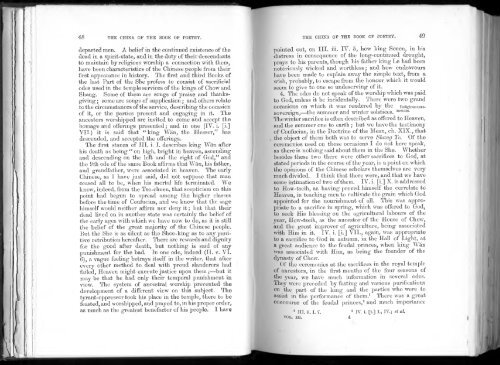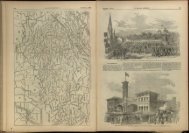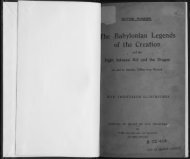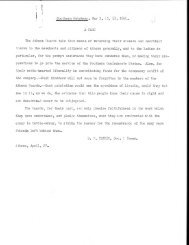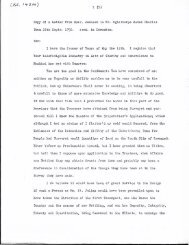THE SHE KING; OR, THE BOOK OF ANCIENT POETRY
THE SHE KING; OR, THE BOOK OF ANCIENT POETRY
THE SHE KING; OR, THE BOOK OF ANCIENT POETRY
Create successful ePaper yourself
Turn your PDF publications into a flip-book with our unique Google optimized e-Paper software.
48 <strong>THE</strong> CHINA <strong>OF</strong> <strong>THE</strong> <strong>BOOK</strong> <strong>OF</strong> POETEY. <strong>THE</strong> CHINA <strong>OF</strong> <strong>THE</strong> <strong>BOOK</strong> <strong>OF</strong> POETEY. 49<br />
departed men. A belief in the continued existence of the<br />
dead in a spirit-state, and in the duty of their descendants<br />
to maintain by religious worship a connection with them,<br />
have been characteristics of the Chinese people from their<br />
first appearance in history. The first and third Books of<br />
the last Part of the She profess to consist of sacrificial<br />
odes used in the temple services of the kings of Chow and<br />
Shang. Some of them are songs of praise and thanks<br />
giving ; some are songs of supplication ; and others relate<br />
to the circumstances of the service, describing the occasion<br />
of it, or the parties present and engaging in it. The<br />
ancestors worshipped are invited to come and accept the<br />
homage and offerings presented; and in one (IV. i. [i.]<br />
VII.) it is said that "king Wan, the Blesser," has<br />
descended, and accepted the offerings.<br />
The first stanza of III. i. I. describes king Wan after<br />
his death as being " on high, bright in heaven, ascending<br />
and descending on the left and the right of God," and<br />
the 9th ode of the same Book affirms that Wan, his father,<br />
and grandfather, were associated in heaven. The early<br />
Chinese, as I have just said, did not suppose that man<br />
ceased all to be, when his mortal life terminated. We<br />
know, indeed, from the Tso-cliuen, that scepticism on this<br />
point had begun to spread among the higher classes<br />
before the time of Confucius, and we know that the sage<br />
himself would neither affirm nor deny it; but that their<br />
dead lived on in another state was certainly the belief of<br />
the early ages with which we have now to do, as it is still<br />
the belief of the great majority of the Chinese people.<br />
But the She is as silent as tho Shoo-king as to any puni<br />
tive retribution hereafter. There are rewards and dignity<br />
for the good after death, but nothing is said of any<br />
punishment for the bad. In one ode, indeed (II. v. VI.<br />
6), a vague feeling betrays itself in the writer, that after<br />
every other method to deal with proud slanderers had<br />
failed, Heaven might execute justice upon them;—but it<br />
may be that he had only their temporal punishment in<br />
view. The system of ancestral worship prevented the<br />
development of a different view on this subject. The<br />
tyrant-oppressor took his place in the temple, there to be<br />
feasted, and worshipped, and prayed to, in his proper order,<br />
as much as the greatest benefactor of his people. I have<br />
pointed out, on III. iii. IV. 5, how king Seuen, in his<br />
distress in consequence of the long-continued drought,<br />
prays to his parents, though his father king Le had been<br />
notoriously wicked and worthless; and how endeavours<br />
have been made to explain away the simple text, from a<br />
wish, probably, to escape from the honour which it would<br />
seem to give to one so undeserving of it.<br />
4. The odes do not speak of the worship which was paid<br />
to God, unless it be incidentally. There were two grand<br />
occasions on which it was rendered by the Beiigious cere-<br />
sovereign,—the summer and winter solstices. momes-<br />
The winter sacrifice is often described as offered to Heaven,<br />
and the summer one to earth; but we have the testimony<br />
of Confucius, in the Doctrine of the Mean, ch. XIX., that<br />
I, the object of them both was to serve Shang Te. Of the<br />
ceremonies used on those occasions I do not here speak,<br />
as there is nothing said about them in the She. Whether<br />
besides these two there were other sacrifices to God, at<br />
stated periods in the course of the year, is a point on which<br />
the opinions of the Chinese scholars themselves are very<br />
much divided. I think that there were, and that we have<br />
some intimation of two of them. IV. i. [i.] X. is addressed<br />
to How-tseih, as having proved himself the correlate to<br />
Heaven, in teaching men to cultivate the grain which God<br />
appointed for the nourishment of all. This was appro<br />
priate to a sacrifice in spring, which was offered to God,<br />
to seek His blessing on the agricultural labours of the<br />
year, How-tseih, as the ancestor of the House of Chow,<br />
and the great improver of agriculture, being associated<br />
with Him in it. IV. i. [i.] VII., again, was appropriate<br />
to a sacrifice to God in autumn, in the Hall of Light, at<br />
a great audience to the feudal princes, when king Wan<br />
was associated with Him, as being the founder of the<br />
dynasty of Chow.<br />
Of the ceremonies at the sacrifices in the royal temple<br />
of ancestors, in the first months of the four seasons of<br />
the year, we have much information in several odes.<br />
They were preceded by fasting and various purifications<br />
on the part of the king and the parties who were to<br />
assist in the performance of them. 1 There was a great<br />
concourse of the feudal princes, 2 and much importance<br />
1 III. ii. I. 7.<br />
VOL. III.<br />
IV. i. [i.] I., IV.; et al.


